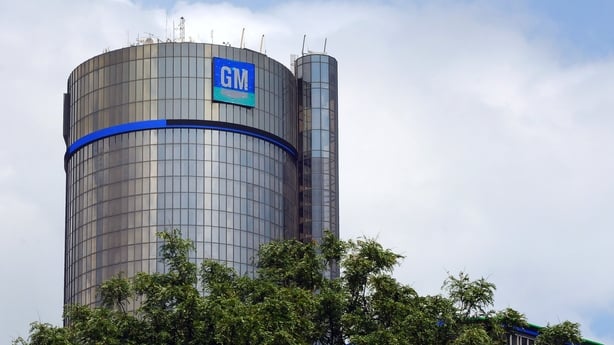General Motors has today withdrawn its 2023 profit outlook, blaming the rising costs of United Auto Workers strikes.
But the automaker's shares rose on better-than-expected third-quarter results and a shift toward turning a profit on electric vehicles instead of hitting sales targets.
GM's third-quarter net income fell 7.3% to $3.06 billion, while revenue rose 5.4% to $44.1 billion.
The adjusted earnings per share tracked by analysts were $2.28, ahead of Wall Street expectations and up from $2.25 a year ago because of the effect of share buybacks.
The rising toll of the UAW strikes, the outlook for higher labour costs once a new contract is reached, rising warranty expenses and an uncertain macro-economic outlook have forced GM to abandon previous targets for full-year financial performance that it had lifted in July.
Wells Fargo analyst Colin Langan said the strike impact was not surprising.
The UAW walkouts cost the company $200m during the third quarter and $600m so far in the fourth quarter, GM Chief Financial Officer Paul Jacobson said in a briefing with reporters.
Strike costs are now running at $200m a week, Jacobson said.
He would not discuss the potential impact should UAW President Shawn Fain order new walkouts at GM's most profitable North American factories such as the Arlington, Texas, plant that builds Cadillac Escalades and Chevrolet Suburbans, or the Flint, Michigan, heavy-duty pickup assembly plant.
As the pace of EV sales growth has slowed in North America and even industry leader Tesla is expressing caution over the pace of its expansion, GM is re-working its EV strategy in the region, pulling back from efforts to challenge Tesla's lead in the US EV segment.

GM chief executive Mary Barra said the automaker's EV strategy going forward will be to match production to demand to avoid deep discounts. GM is also slowing the launch of several EV models to cut their costs, and pulling back on EV product spending.
GM will save billions thanks to a decision to re-design and re-launch the Chevrolet Bolt EV, using lower-cost lithium-iron batteries, and jettisoning an earlier plan to spend $5 billion for several new entry-level EVs, Barra said.
GM is abandoning a goal of building 400,000 EVs from 2022 through mid-2024, Jacobson said.
GM CEO Mary Barra had reaffirmed that target in July, before the UAW strikes began consuming cash, at a time when GM had also raised its 2023 operating profit forecast to a range of $12 billion-$14 billion.
"We're just not going to be talking about the interim production goals," Jacobson said. "We want to make sure we're balancing that against what we see out there. The real focus is getting to 1 million EVs of production by the end of 2025 alongside hitting our margin targets."
Barra in a shareholder letter today said GM has "work to do" to hit its low- to mid-single-digit earnings before interest and taxes (EBIT) margin target by 2025.
GM's decision to delay retooling of a large factory in Orion Township, Michigan, to build electric pickup trucks will save $1.5 billion in capital investments in 2024, Jacobson said.
The delay in electric truck expansion "will actually allow us to incorporate some of the changes and improvements that we've seen in early-stage production" and improve profit margins when the electric Silverados and GMC Sierras start production, he said.
The company has joined other automakers in urging the Biden administration to back away from ambitious emissions and fuel economy rules aimed at pushing EVs to two-thirds of the US vehicle market by 2032.
So far, GM's sales and pricing in North America have remained stable. Average selling prices for GM vehicles were $50,750 in the latest quarter, slightly down from the previous quarter.

However, the automaker said its cost-cutting efforts only "partially offset" higher costs for EV launches, increased warranty expenses and lower pension income in the quarter.
Overall, GM said profits for the quarter were pulled down by $1.5 billion because of higher costs and the impact of selling more EVs. Unlike rival Ford, GM does not break out losses from its EV operations.
Jacobson said GM executives are concerned about rising interest rates as well as the conflict in the Middle East and whether that could impact consumer behaviour. But he did not echo Tesla CEO Elon Musk's pessimism about the impact of rising interest rates on consumer demand.
"What I would tell you is that so far the consumer has held up remarkably well for us as evidenced by the average transaction prices," Jacobson said.
GM also said losses at its Cruise robotaxi unit widened to $732m in the quarter. GM said the losses were "in line with expectations" as operations expanded to 15 cities.

